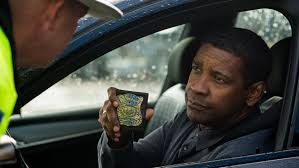AUDIO PODCAST OPTION OF JOKER REVIEW
SHORT TAKE:
Joaquin Phoenix’ mesmerizing and brilliant performance as Joker is wasted in the nihilistic plot of this realism grounded, extremely disturbing, origin story.
WHO SHOULD GO:
ABSOLUTELY ADULTS ONLY. This is not Caeser Romero. Heck this isn’t even Heath Ledger. Extreme violence, profane language, discussions of child abuse and neglect, demonstrations of mental illness all make for a showing difficult for most adults to see much less children.
LONG TAKE:
Under tour-de-force in the dictionary you should find a picture of Joaquin Phoenix in costume as Joker/Arthur Fleck from the movie of the same name. His performance in and as Joker should go down in cinematic history as a watershed accomplishment in the creation of an onscreen character.
The story in Joker is of a man’s descent into madness, and for Arthur Fleck, while the trip isn’t very long, it is shown in slow motion.
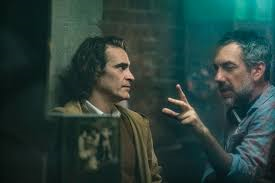 Todd Phillips, writer/director, takes a stab at what could be described as a documentary about the real story behind Joker, from which all of the cartoons and comic books were based, told in an observational style, as though Jane Goodall had hidden cameras on Arthur Fleck instead of gorillas.
Todd Phillips, writer/director, takes a stab at what could be described as a documentary about the real story behind Joker, from which all of the cartoons and comic books were based, told in an observational style, as though Jane Goodall had hidden cameras on Arthur Fleck instead of gorillas.
Without giving too much away,  Arthur is not born but created, as he suffers mentally, emotionally and physically at the hands of a mental health system which fails him, the people who should have protected him, and a violent uncaring culture which takes advantage of his initial simple view of life.
Arthur is not born but created, as he suffers mentally, emotionally and physically at the hands of a mental health system which fails him, the people who should have protected him, and a violent uncaring culture which takes advantage of his initial simple view of life.
One of the main characters in Joker is invisible – the soundtrack.  The music accompanying Joker is incredible, following Arthur like an unseen ghost, drawing in his madness and breathing it out again for others to hear. Hildur Guonadottir, an Icelandic composer, weaves a web of truly haunting cello music which, at turns, lulls and aggressively pursues the listener, echoing Arthur’s multi-faceted insanity: his depressed, hopeless state of mind, his hallucinatory flights of fancy, as well as his manic episodes of single-minded determination.
The music accompanying Joker is incredible, following Arthur like an unseen ghost, drawing in his madness and breathing it out again for others to hear. Hildur Guonadottir, an Icelandic composer, weaves a web of truly haunting cello music which, at turns, lulls and aggressively pursues the listener, echoing Arthur’s multi-faceted insanity: his depressed, hopeless state of mind, his hallucinatory flights of fancy, as well as his manic episodes of single-minded determination.
The cinematography visualized by Lawrence Sher is masterful. From the grim hues and motifs of rain and shadow, to the camera work which uses techniques such as the “dolly zoom” aka the “Vertigo Effect” where the camera pulls back and zooms forward at the same time – all work together to allow a bleak and twisted perspective into Arthur’s broken mind.
But, most tragic, all this wealth of creativity and talent is ultimately wasted.
While Joker, as I mentioned, can arguably be considered the origin story from which all the other legends and mythology of the D.C. Joker emerge, especially the cartoons, the comics, and Jack Nicholson’s rendition, the viewing of the movie is a long travail of suffering with very little purpose. In films like Les Misérables, for example, the suffering of 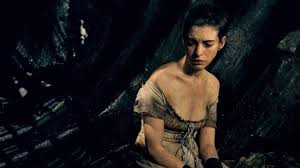 Fantine and Jean Val Jean is altruistic and ultimately redemptive, teaching humility and mercy to the characters and vicariously to the audience. In Man of La Mancha, the prostitute,
Fantine and Jean Val Jean is altruistic and ultimately redemptive, teaching humility and mercy to the characters and vicariously to the audience. In Man of La Mancha, the prostitute, 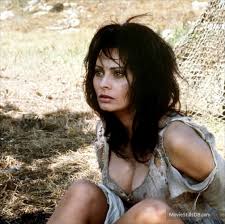 Aldonza, is shown literally and figuratively in the ditch in which she self describes as having been born, in order to illuminate how far Don Quixote’s kindness brings her when she reforms. Even silly fare like disaster movies serve as a mechanism for the characters to show courage and self-sacrifice.
Aldonza, is shown literally and figuratively in the ditch in which she self describes as having been born, in order to illuminate how far Don Quixote’s kindness brings her when she reforms. Even silly fare like disaster movies serve as a mechanism for the characters to show courage and self-sacrifice.
In The Dark Knight, 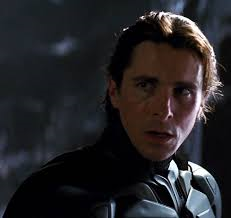 Bruce’s losses mold and inspire him into becoming a self-appointed defender of the weak and innocent. And there are Judeo-Christian motifs in the Dark Knight. Bruce Wayne dies to himself everyday, denying his own comfort and pleasures, instead taking on the sins of others, all the while pitted against the remorseless demonic figure of Heath Ledger’s Joker.
Bruce’s losses mold and inspire him into becoming a self-appointed defender of the weak and innocent. And there are Judeo-Christian motifs in the Dark Knight. Bruce Wayne dies to himself everyday, denying his own comfort and pleasures, instead taking on the sins of others, all the while pitted against the remorseless demonic figure of Heath Ledger’s Joker.
 Even farces such as Mad Mad Mad Mad World, which feature the ne’erdowell indulgence of greedy impulses by groups of people succumbing to temptations, serve as lessons in horrible warnings against sinking into the mire of one’s baser instincts. The Mad Mad ensemble put themselves through brutal punishments and ultimately go to jail – all while making us LAUGH.
Even farces such as Mad Mad Mad Mad World, which feature the ne’erdowell indulgence of greedy impulses by groups of people succumbing to temptations, serve as lessons in horrible warnings against sinking into the mire of one’s baser instincts. The Mad Mad ensemble put themselves through brutal punishments and ultimately go to jail – all while making us LAUGH.
But there is nothing absolutive in Joker, nor are there any hints of a reckoning to come. 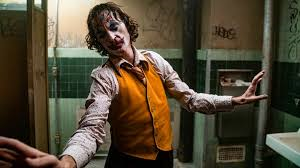 And there is no proportionate justice for the wicked, especially not for Arthur, no purpose to anyone’s suffering and no humor. Joker is unrelentingly grim, unendingly dark, and grindingly depressing. In the end, the audience is left only with the familiar figure of a boy standing over the dead bodies of his parents and the dancing of Arthur in his Joker costume amidst the rampaging rioters in a burning Gotham.
And there is no proportionate justice for the wicked, especially not for Arthur, no purpose to anyone’s suffering and no humor. Joker is unrelentingly grim, unendingly dark, and grindingly depressing. In the end, the audience is left only with the familiar figure of a boy standing over the dead bodies of his parents and the dancing of Arthur in his Joker costume amidst the rampaging rioters in a burning Gotham.
Joker does serve as a  demonstration in favor of institutionalizing the mentally disturbed as opposed to releasing into the “wild” those incapable of functioning in society.
demonstration in favor of institutionalizing the mentally disturbed as opposed to releasing into the “wild” those incapable of functioning in society.
It also serves as a horrible warning against the efficacy of vigilante justice as Arthur quickly moves from killing in self defense, 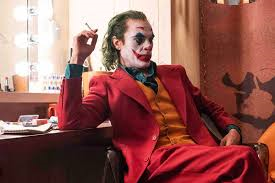 to murder in order to cover his actions, to vengeance against those he believes have harmed him, to serving as judge, jury and executioner against those he deems as “awful”.
to murder in order to cover his actions, to vengeance against those he believes have harmed him, to serving as judge, jury and executioner against those he deems as “awful”.
But there is nothing redemptive, or self-sacrificing about Joker’s actions. There is no moral base from which Arthur even attempts to rationalize his behavior. There is nothing to learn from the pain which Arthur endures or inflicts.
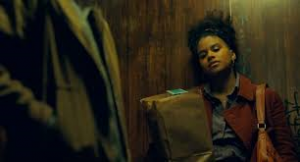 Zazie Beetz (Deadpool 2) is his exhausted single-mother neighbor Sophie,
Zazie Beetz (Deadpool 2) is his exhausted single-mother neighbor Sophie,  Brett Cullen (Dark Knight Rises) plays Thomas Wayne,
Brett Cullen (Dark Knight Rises) plays Thomas Wayne, 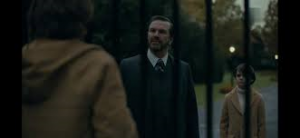 Douglas Hodge makes a singular impression as Alfred Pennyworth, one of the only characters in the movie whose focus is not on themselves, as his primary concern is to protect Bruce, and
Douglas Hodge makes a singular impression as Alfred Pennyworth, one of the only characters in the movie whose focus is not on themselves, as his primary concern is to protect Bruce, and  Dante Pereira-Olson plays young Bruce.
Dante Pereira-Olson plays young Bruce.
 Robert De Niro has a small role, as talk show host Murray Franklin. DeNiro’s presence is delicious irony. De Niro has played both a character as equally as unhinged as Arthur in
Robert De Niro has a small role, as talk show host Murray Franklin. DeNiro’s presence is delicious irony. De Niro has played both a character as equally as unhinged as Arthur in 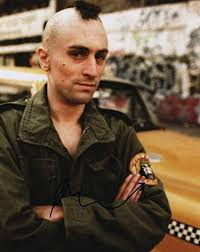 Taxi Driver and as demented a fan who faces off against an idealized talk show host in the lesser known King of Comedy. DeNiro’s resume is incredible, featuring a list of movies with enough quality and variety to have secured the careers of a dozen actors: the casual, criminal violence in the characters of
Taxi Driver and as demented a fan who faces off against an idealized talk show host in the lesser known King of Comedy. DeNiro’s resume is incredible, featuring a list of movies with enough quality and variety to have secured the careers of a dozen actors: the casual, criminal violence in the characters of 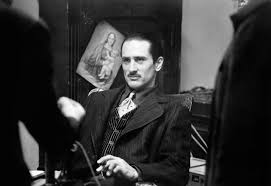 The Godfather II, The Irishman, and Cape Fear, the flawed heroes struggling in the dark worlds of Midnight Run,
The Godfather II, The Irishman, and Cape Fear, the flawed heroes struggling in the dark worlds of Midnight Run, 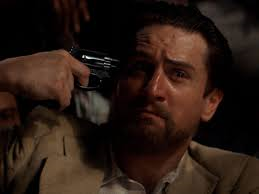 Deer Hunter and Taxi Driver, the boxer in Raging Bull, the captain of a fantasy ship in the light farce
Deer Hunter and Taxi Driver, the boxer in Raging Bull, the captain of a fantasy ship in the light farce  Stardust, the aging lead in the romantic comedy
Stardust, the aging lead in the romantic comedy  The Intern, the slaver turned priest in
The Intern, the slaver turned priest in  The Mission, the grim and frightening Al Capone in
The Mission, the grim and frightening Al Capone in 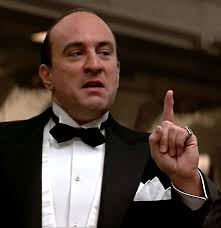 The Untouchables, the moving victim of catatonia in
The Untouchables, the moving victim of catatonia in  Awakenings. De Niro is impossible to pin down. Admittedly, it is a testament to the quality to which the filmmakers were aiming in Joker, that the legendary De Niro, himself a master at his craft, would agree to participate.
Awakenings. De Niro is impossible to pin down. Admittedly, it is a testament to the quality to which the filmmakers were aiming in Joker, that the legendary De Niro, himself a master at his craft, would agree to participate.
Unfortunately, the abundance of talent in Joker does not resolve the ultimate meaninglessness of the plot. The audience, much like Arthur, suffers pointlessly in following Arthur’s moral and mental descent.
 While Joaquin Phoenix’ performance is mesmerizing and probably should serve in every acting class as a “how to create a character on screen” and while the director and the music serve, with masterful art, to bring us into Arthur’s state of mind and point of view, the journey ultimately has no end, no goal, and no exit strategy from the depths into which Arthur is thrown or the hole he continues to dig at the bottom of his well.
While Joaquin Phoenix’ performance is mesmerizing and probably should serve in every acting class as a “how to create a character on screen” and while the director and the music serve, with masterful art, to bring us into Arthur’s state of mind and point of view, the journey ultimately has no end, no goal, and no exit strategy from the depths into which Arthur is thrown or the hole he continues to dig at the bottom of his well.
As of the writing of this article Joker is the highest grossing R-rated movie ever made.  And it is disturbing to consider that such a pointlessly violent and unrepentantly dark film should attract so much attention.
And it is disturbing to consider that such a pointlessly violent and unrepentantly dark film should attract so much attention.
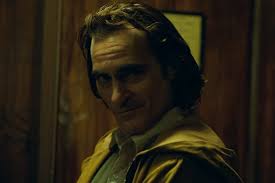 If you are a student of acting, Joker is worth enduring for Phoenix’ performance. But for those just seeking entertainment or an extension to the D.C. world of Batman and Joker, give this one a miss and re-watch 2008’s The Dark Knight.
If you are a student of acting, Joker is worth enduring for Phoenix’ performance. But for those just seeking entertainment or an extension to the D.C. world of Batman and Joker, give this one a miss and re-watch 2008’s The Dark Knight. 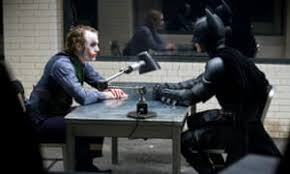



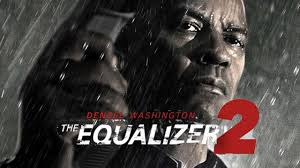
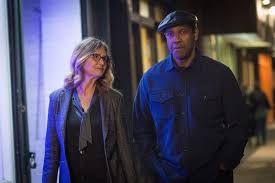 One of the rules of good scriptwriting is SHOW DON'T TELL and I think Equalizer 2 did a (excuse the pun) bang up good job on this point.
One of the rules of good scriptwriting is SHOW DON'T TELL and I think Equalizer 2 did a (excuse the pun) bang up good job on this point.
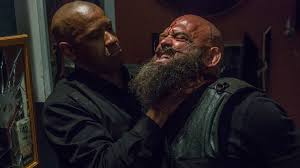 The main storyline of Equalizer 2 follows McCall when, about a half hour into the movie, his friend is brutally murdered.
The main storyline of Equalizer 2 follows McCall when, about a half hour into the movie, his friend is brutally murdered. 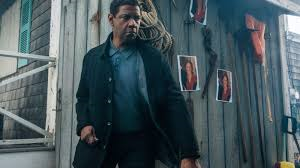 McCall announces, is expected to, and eventually does, take violent retribution against the perpetrators. But I found the subplots, and the way the narrative is handled, far more interesting.
McCall announces, is expected to, and eventually does, take violent retribution against the perpetrators. But I found the subplots, and the way the narrative is handled, far more interesting.
 For example, the movie starts, (and not properly a spoiler as it is in the trailer) with a Muslim-costumed Denzel Washington confronting Turkish thugs on a train. Only later, as he goes about his normal routine back in Chicago do we OBSERVE how he knew of a problem and what it would take to fix it. The set up and solution were very quietly and subtly handled. And this small subplot did not even directly relate to the main action, but only served to establish McCall's abilities and personality.
For example, the movie starts, (and not properly a spoiler as it is in the trailer) with a Muslim-costumed Denzel Washington confronting Turkish thugs on a train. Only later, as he goes about his normal routine back in Chicago do we OBSERVE how he knew of a problem and what it would take to fix it. The set up and solution were very quietly and subtly handled. And this small subplot did not even directly relate to the main action, but only served to establish McCall's abilities and personality.
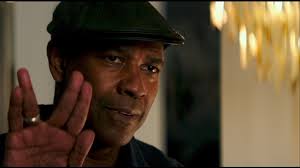 The most compelling part of the screenplay was how McCall exercises that platitude of doing random acts of kindness using the gifts we have. For us ordinary mortals, it might be holding someone's door open or even paying for the coffee of the stranger in line behind you.
The most compelling part of the screenplay was how McCall exercises that platitude of doing random acts of kindness using the gifts we have. For us ordinary mortals, it might be holding someone's door open or even paying for the coffee of the stranger in line behind you. 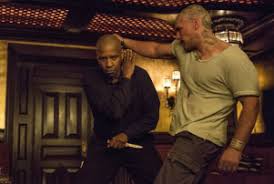 For McCall it's beating the tar out of dangerous, abusive men then making them call the cops on themselves afterwards. When asked why he would take on the job of cleaning spray paint graffiti off of a wall when anyone else could do it, he responds that, although anyone else COULD, no one else DOES, so he does. This is the mantra from which he lives and a motto which raises the bar on what could otherwise have been just another Death Wish vigilante violence porn clone. While I'm not advocating vigilantism, often the mentality is a "kill them all and let God sort them out" philosophy.
For McCall it's beating the tar out of dangerous, abusive men then making them call the cops on themselves afterwards. When asked why he would take on the job of cleaning spray paint graffiti off of a wall when anyone else could do it, he responds that, although anyone else COULD, no one else DOES, so he does. This is the mantra from which he lives and a motto which raises the bar on what could otherwise have been just another Death Wish vigilante violence porn clone. While I'm not advocating vigilantism, often the mentality is a "kill them all and let God sort them out" philosophy.
